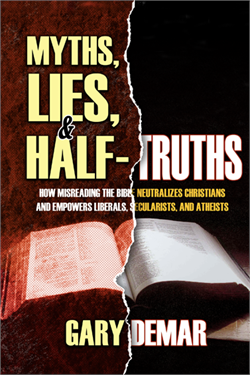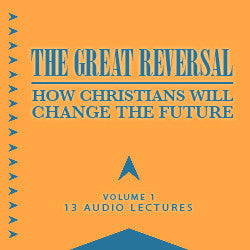Have you noticed that when dogs are being disciplined for something they’ve done, some of them close their eyes or attempt to slink away and hide, as if their response is going to change the unpleasant outcome? Well, we’re not dogs. Closing our eyes to what’s happening in this world only allows those creating the havoc to be even more emboldened.

Myths, Lies, and Half-Truths
Myths, Lies, and Half-Truths takes a closer look at God's Word and applies it to erroneous misinterpretations of the Bible that have resulted in a virtual shut-down of the church's full-orbed mission in the world (Acts 20:27). Due to these mistaken interpretations and applications of popular Bible texts to contemporary issues, the Christian faith is being thrown out and trampled under foot by men (Matt. 5:13).
Buy NowIn a conference a few years ago, I emphasized the importance of biblical optimism during attacks, persecution, and the advance of secularism and Islam (the real global threat). Young people need to believe that the future needs to be embraced, that not everything is gloom and doom, and that there is a way forward beyond escapism.
To be overly preoccupied with the future at the expense of the present is to replace discipleship with dreaming. God, the source of all hope, also is the source of the commission for believers to go into all the world as redemptive forerunners of the future that already is breaking into the present, first through the life, death, and resurrection of Jesus, and now through the ministry of the spirit of the Christ and the faithfulness of the people of the Christ, the church. To be with God tomorrow requires being about God’s business today! In New Testament thought, serious discipleship takes priority over speculative dispensationalism; the significance of Pentecost far outweighs that of Christian ponderings about purgatory, premillennialism, and the perseverance of the Saints. The call from the future of God and the foundation for participating in God’s future focus on the present work of the Spirit in fashioning new creations fit for the tasks at hand in the future yet to be.
*****
The new generation, now being called Baby Busters or Generation X, features people with a lack of hope. These millions of young adults tend to live only for the moment and often feel disconnected from others. They are pessimistic about the future and have learned not to trust anyone who offers absolute answers on major questions about life and the future.[1] If Christianity has the right answers, they often asked, why can it not keep its own house in order? Is not the world of Christians divided, scandal-ridden, and escapist, just more of the problem? They deserve an answer. The biblical answer centers in a right understanding of Christian eschatology—and then, of course, a putting of that understanding into beneficial practice in today’s world. In the biblical view, a focus on final things is never to be disconnected from a commitment to present responsibilities in light of those final things.[2]
This is not a popular opinion. Prophecy writers, worldview dualists, and theologians preoccupied with what happens after death often dismiss the importance and sacredness of the present moment. Everything God created is good (Ge. 1:31; 1 Tim. 4:4) when approached in a spirit of prayer and conformity to God’s Word, even in a fallen world. Bill Maher claimed that the Enlightenment gave us a better world. The Enlightenment drew upon the moral and scientific foundation that Christians had laid. Consistent Darwinism (randomness) undermined the operating principles of the Enlightenment. This meant that scientists had to be inconsistent to maintain rationality and the expectation of predictability in scientific work. Then there was the problem of accounting for ethics in an evolving cosmos. “Given the close relationship between Darwinism and the horrific crimes committed by Mussolini, Hitler, Stalin, Mao and Pol Pot’s Khmer Rouge Regime we are forced to conclude that ours [the 20th century] has been the Darwinian century.”[3] Consider this 1888 carved-in-stone inscription over the front door of the City Hall of Cambridge, Massachusetts (see photo above). Sounds like something a Christian Nationalist might say.
God has given Commandments unto Men. From these Commandments, Men have framed Laws by which to be governed. It is honorable and praiseworthy to serve the people administering these Laws faithfully. If the Laws are not enforced, the People are not well governed.
Consider the following about Tom Holland’s book Dominion by Jonathon Van Maren. Keep in mind that Holland is an atheist.
While studying the ancient world, Holland writes, he realized something. Simply, the ancients were cruel, and their values utterly foreign to him. The Spartans routinely murdered “imperfect” children. The bodies of slaves were treated like outlets for the physical pleasure of those with power. Infanticide was common. The poor and the weak had no rights.
How did we get from there to here? It was Christianity, Holland writes. Christianity revolutionized sex and marriage, demanding that men control themselves and prohibiting all forms of rape. Christianity confined sexuality within monogamy. (It is ironic, Holland notes, that these are now the very standards for which Christianity is derided.) Christianity elevated women. In short, Christianity utterly transformed the world.
In fact, Holland points out that without Christianity, the Western world would not exist. Even the claims of the social justice warriors who despise the faith of their ancestors rest on a foundation of Judeo-Christian values.
It’s amusing to watch young people denounce capitalism while reading notes from their smartphones. They can only denounce capitalism by using the fruits of capitalism. Similarly, too many Christians have disengaged from the world because they believe it can’t be redeemed. They offer a supposed biblical solution by proposing an eschatological escape hatch.

The Great Reversal
This MP3 download includes the audio of 26 talks from the 2009 Worldview Super Conference III - The Great Reversal: How Christians Will Change the Future.
Buy NowGary North pointed out that an individualized version of postmillennialism accelerated after the War Between the States and led to a rise of an extreme pietistic version of premillennialism:[4]
The transformation of American evangelicalism from the triumphalism of the Civil War era into the world-abandoning pietism of the late nineteenth century has been chronicled by Douglas Frank in his aptly titled book, Less Than Conquerors,[5] a play on words of Paul’s statement, “Nay, in all these things we are more than conquerors through him that loved us” [Rom. 8:37]. George Marsden, one of the premier American church historians, argues that this transformation came in two stages: (1) from 1865 to 1900, a declining interest in political action; (2) from 1900 to 1930, “when all progressive social concern, whether political or private, became suspect among revivalist evangelicals and was relegated to a very minor role.”[6] He calls the second stage the Great Reversal.[7] This shift involved a shift in eschatology: from postmillennialism to premillennialism.[8]
Schizophrenia exists among Evangelicals. They are called on to engage the world while being told that they won’t be successful. But don’t fear, because Jesus is coming soon to rescue us! Schizophrenics can’t build civilizations.
[1] See Todd Hahn and David Verhaagen, Reckless Hope: Understanding and Reaching Baby Busters (Grand Rapids: Baker Books, 1996).
[2] Barry L. Callen, Faithful in the Meantime: A Biblical View of Final Things and Present Responsibilities (Eugene, OR: Wipf & Stock, [1997] 2017), 13-14, 16.
[3] F. W. Schnitzler, “Darwinian Violence,” Christianity and Society, 4:3 (July 1994), 28.
[4] Gary North, “Millennialism and the Progressive Movement,” The Journal of Libertarian Studies, 131.
[5] Douglas W. Frank, Less Than Conquerors: How the Evangelicals Entered the Twentieth Century (Grand Rapids, MI: Eerdmans, 1986).
[6] George M. Marsden, Fundamentalism and American Culture: The Shaping of Twentieth Century Evangelicalism, 1870-1925 (New York: Oxford University Press, 1980), 86.
[7] Marsden, Fundamentalism and American Culture, chap. 10.
[8] James H. Moorhead, “The Erosion of Postmillennialism in American Religious Thought, 1865-1925,” Church History, LIII (March 1984), 61-77.

